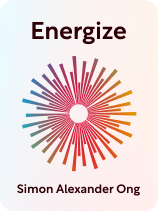

This article is an excerpt from the Shortform book guide to "Energize" by Simon Alexander Ong. Shortform has the world's best summaries and analyses of books you should be reading.
Like this article? Sign up for a free trial here.
Is mental energy just as important as physical energy? How can you keep yourself invigorated throughout the day?
How much energy you have depends on both your body and your mind, and how you care for them. Simon Alexander Ong says you can raise and maintain your personal energy by treating your body well, feeding your mind, and letting your energy levels recharge.
Keep reading to learn how to maintain energy, both physically and mentally.
1. Nourish Your Body
It should come as no surprise that how much energy you have depends greatly on your physical health. Neglecting your health can lead to burnout and exhaustion, which can stop you from finding your direction in life. While you can’t control everything that happens in your body, Ong identifies three cornerstone habits to focus on if you want to learn how to maintain energy—exercise, diet, and sleep.
Ong explains that exercise triggers a reaction in your body that releases mood-lifting hormones that increase your overall energy. However, exercise won’t lift your spirits if it’s something that you dread. Therefore, it’s important to discover forms of exercise that you actually like. Some people prefer hiking in nature or walking through parks instead of going to the gym. You may find that you enjoy cycling or yoga as part of your exercise plan. Ong suggests that you give yourself a variety of exercise options to choose from so that you don’t feel stuck in a routine, and that you make some form of exercise a can’t-skip part of your daily regimen.
Diet plays an equally significant role in raising your body’s available energy. It’s a simple equation—food equals fuel, but you need to make sure you have the right fuel in your tank. Ong doesn’t point to any modern diet fads, but simply emphasizes the importance of staying hydrated, eating balanced meals, and incorporating energy-boosting, nutrient-rich fruits and vegetables into your diet in place of valueless, over-processed snacks. When it comes to what we eat, temptations abound, so if you want to make healthy choices, Ong recommends planning your meals ahead so you can strategically ensure you have foods available that support your energy.
2. Nourish Your Mind
As important as it is to take care of your physical needs, you can’t focus and direct your energy without also taking care of your mental and emotional well-being. Most of the qualities we think of as “high-energy”—such as leadership, enthusiasm, and determination—are mental states that can only thrive if you nurture a healthy mindset. Ong highlights continual learning and inner reflection as tools that benefit your mind the way that exercise, good food, and sleep do for your body.
Making lifelong learning a habit will open your mind to new perspectives that serve as a wellspring for mental energy. Chief among these is curiosity, the underlying basis for original thinking, innovation, and creativity. The trick is learning how to stay curious in situations where you think you’re an expert. Ong suggests that you approach every situation as if you’re a novice, even when you’re not. Asking questions can lead to surprising answers you’d never have considered from your own point of view. Unexpected answers point to creative solutions, but the unexpected also breeds excitement. Therefore, being curious about what you already “know” brings your mind a sense of energy you wouldn’t have otherwise tapped.
If you’re going to ask questions, you must also learn to listen. Ong writes that being a good listener lets you learn from others while also building and energizing relationships. Effective listening makes others feel valued, so especially if you’re in a leadership role, you can use your questions to let others on your team open up about their ideas. This serves a dual purpose—it feeds your curiosity while letting those around you feel energized and empowered. Don’t worry that asking questions will make you seem weak or tarnish your image—Ong argues that the opposite is true, and many of today’s top leaders are marked by their openness to new ideas from any source available to them.
3. Replenish Your Reserves
Before you start to get the impression that you should be energetic all of the time, Ong says that’s far from the truth. Instead, you should think of your energy as a valuable resource that must be carefully managed. You do this by giving yourself time to relax, avoiding doing things that will pointlessly drain you, and cultivating relationships that give you energy instead of taking it away.
First, Ong writes that it’s important to know how your energy fluctuates throughout the day. You may already be aware of your patterns, but you should still track your day’s highs and lows so you can schedule your most important tasks for when your energy peaks. You should also schedule breaks, since daily life will often find ways to distract you from relaxing. Ong is in favor of using your breaks to clear your mind instead of seeking further distractions like the internet. It’s when your mind is at its most quiet that your best ideas can bubble to the surface. Quiet time also lets your energy recover—whether you’re strolling through a park or meditating in your office. Like sleep at night, breaks during the day are vital to staving off energy exhaustion.
Ong says that as important as it is to know your energy cycles, you also need to determine what takes energy away from you and set up barriers against it. In today’s world, your energy is constantly under attack by distractions such as emails, phone calls, meetings, to-do lists, and a barrage of social expectations. All these things can siphon energy from you at times when you need it most, so you may have to set up deliberate walls—turning off your phone, closing your office, and scheduling time for uninterrupted focus. The hardest part may be learning to turn down requests from friends, family, and colleagues that will take you away from pursuing your goals. You can set boundaries gracefully, but nevertheless, they should be firm.

———End of Preview———
Like what you just read? Read the rest of the world's best book summary and analysis of Simon Alexander Ong's "Energize" at Shortform.
Here's what you'll find in our full Energize summary:
- How to cultivate and replenish your energy
- Why your personal energy can be infectious
- How money can give you energy and take it away






